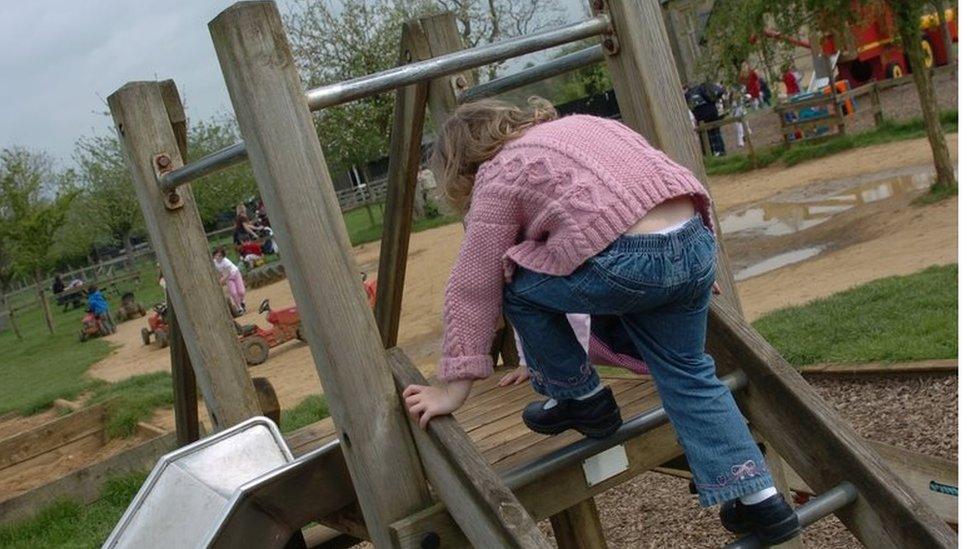Public parks in danger of falling into neglect, warn MPs
- Published

Parks are seeing playgrounds removed in a spending squeeze, MPs say
Public parks are at risk of falling into neglect as funding to maintain them comes under pressure, says a report by a committee of MPs.
The squeeze has resulted in reduced opening hours, the removal of play equipment, toilets closing and more litter, vandalism and rats, MPs said.
They urged councils to find new ways to fund and manage parks.
The Local Government Association said councils have to balance spending on parks against other priorities.
The report by the Commons Communities and Local Government (CLG) Committee argued housing demand was also putting parks at risk, with new homes "nibbling away" at green spaces in some areas.
Unless parks were recognised as "much more than just grass and tulips", there was a risk of turning the clock back to an era of neglect of 20 to 30 years ago, the MPs warned.
Local authorities have no statutory duty to fund and maintain public parks, and a 2014 report by the Heritage Lottery Fund found 86% of park managers had seen cuts to their budgets since 2010.
The UK has about 27,000 public parks attracting 2.6 billion visits a year.
Alternative models
The MPs argued that parks play an important role by:
Helping to integrate communities
Tackling climate change
Preventing flooding
Reducing air pollution exposure
Boosting health
Providing leisure amenities
Councils should publish strategic plans that recognise parks' wider value and consider a range of alternative models for looking after parks, they said.
However, the MPs added, they should remain owned by local authorities and be freely available to everyone.

Parks needed recognising as more than just tulips and grass, the MPs said
The MPs also entered the debate over the free use of parks by organisations such as Parkrun, which hit the headlines when a parish council tried to charge for its weekly runs in a Bristol park last year.
Community organisations, such as Parkrun, which do not charge for participation or raise revenue, could be encouraged to contribute volunteer time to help maintain parks or undertake fundraising, the report said.
'Treasured assets'
Helen Griffiths, chief executive of Fields in Trust, a charity that seeks better statutory protection for recreational spaces, told BBC Radio 4's Today programme that parks can help to get more people active, tackle obesity and address anti-social behaviour.
"I think it is really important that we shouldn't see parks as a drain on our services, not as a budget just for cutting the grass, but as an area that can make a real contribution to tackling some of those very important issues," she said.
Peter Fleming, deputy chairman of the Local Government Association, told BBC Radio 4's Today programme: "Many councils are saying actually the park is an asset that can help things around public health, but also around how we bring open spaces for families who live in urban areas as well.
"But we have to try and balance that spending against those other priorities that councils have, so it is a difficult thing."

Parkrun UK facts and figures:

Parkruns, such as this one in Sheffield joined by Jessica Ennis-Hill, take place across the country
•Number of events - 78,995
•Number of locations - 443
•Average run time - 00:27:54
•Number of runners - 1,199,064
•Total distance run - 69,671,120km.

Clive Betts, Labour chairman of the Commons committee, said: "Parks are treasured public assets, as the overwhelming response to our inquiry demonstrates, but they are at a tipping point and, if we are to prevent a period of decline with potentially severe consequences, then action must be taken."
He said the government had a leadership role to play and volunteers did "fantastic work" but the primary responsibility lay with local authorities.
The vast majority of councils have cut budgets for parks and were likely to cut further, with Newcastle City Council's parks management budget slashed from £2.589m in 2011/12 to £0.253m in 2016/17, the report found.
The government should help councils find innovative ways of managing public parks and green spaces should also be at the heart of planning, the report added.